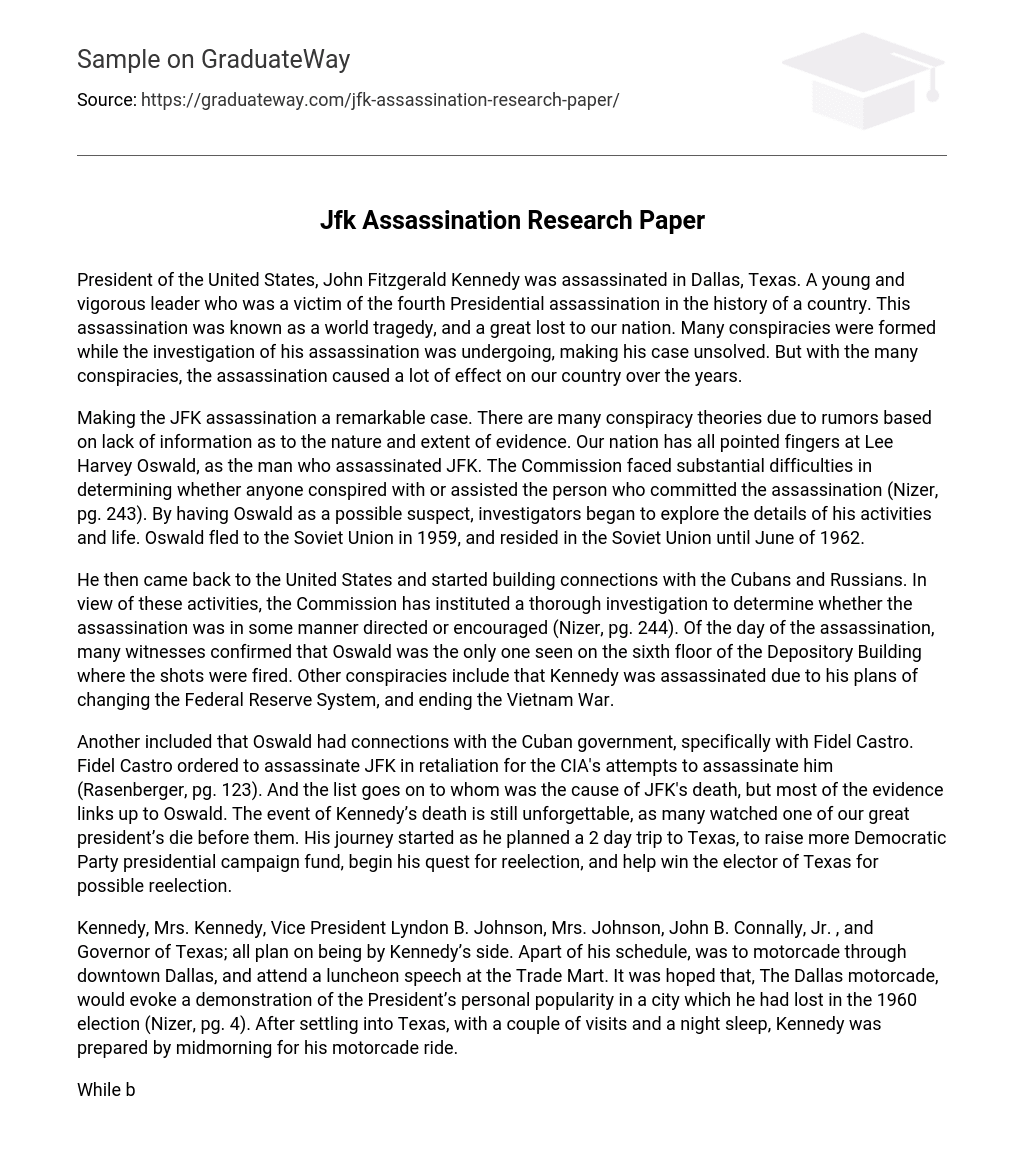John Fitzgerald Kennedy, the President of the United States, was assassinated in Dallas, Texas. Despite being a young and energetic leader, he became the fourth President to be assassinated in our nation’s history. This event had a global impact and was a significant loss for our country. The investigation into his assassination resulted in various unresolved conspiracy theories. Nonetheless, the profound lasting effect of this assassination on our nation remains.
The JFK assassination has sparked many conspiracy theories due to rumors and limited information about the evidence. It is widely believed that Lee Harvey Oswald was responsible for killing JFK, but determining if anyone else aided or collaborated with Oswald in carrying out the assassination proved challenging for the Commission (Nizer, pg. 243). Consequently, investigators focused on examining Oswald’s life and activities. They discovered that Oswald fled to the Soviet Union in 1959 and remained there until June of 1962.
After returning to the United States, he formed alliances with Cubans and Russians. The Commission has launched an investigation to determine if there was any assistance or support in the assassination (Nizer, pg. 244). Many witnesses confirmed that Oswald was the only person seen on the sixth floor of the Depository Building, where the shots came from, on the day of the assassination. Other conspiracy theories propose that Kennedy was murdered due to his plans to change the Federal Reserve System and end the Vietnam War.
One theory posits that Oswald had connections to the Cuban government, specifically Fidel Castro. According to Rasenberger (pg. 123), it is believed that Castro ordered the assassination of JFK as a response to the CIA’s previous attempts on his own life. Although numerous theories exist regarding Kennedy’s death, most evidence implicates Oswald as the perpetrator. The tragic event of Kennedy’s assassination remains deeply ingrained in our collective memory, with countless individuals witnessing the loss of one of our esteemed presidents. His journey commenced with a meticulously planned two-day trip to Texas, aimed at generating funds for his Democratic Party presidential campaign, launching his bid for re-election, and securing electoral support from Texas.
Kennedy, Mrs. Kennedy, Vice President Lyndon B. Johnson, Mrs. Johnson, John B. Connally, Jr., and the Governor of Texas were all planning to join Kennedy on his motorcade through downtown Dallas and his attendance at a luncheon speech at the Trade Mart. The purpose of the motorcade was to highlight the President’s popularity in a city he had lost in the 1960 election (Nizer, pg. 4). Upon arriving in Texas and after settling in with some visits and a night’s rest, Kennedy was ready for his midmorning motorcade ride.
The motorcade in a residential area consisted of Kennedy and his wife in the rear seat, Governor Connally and his wife in the front seat, and two Secret Service Agencies to the front. As they neared the Trade Mart, additional motorcades joined them on Elm Street, passing by the Texas School Book Depository. All of a sudden, shots were fired rapidly. Kennedy instinctively clutched his neck and abruptly moved forward in his seat. He had been shot at the base of his neck, while Governor Connally sustained injuries to his back, chest, wrist, and left thigh.
According to Nizer (pg. 8), Kennedy suffered a severe and fatal injury when another bullet struck the back of his head, causing him to end up in Mrs. Kennedy’s lap. Secret Service Agencies acted swiftly, protecting both Kennedy and his wife as they quickly made their way to Parkland Memorial Hospital, which was approximately 4 miles away. Upon arrival at the hospital, a team of doctors evaluated Kennedy’s body and the seriousness of his wounds. Unfortunately, at 1 p.m., it was announced that Kennedy had died. The entire nation mourned the loss of such a wise and prosperous man.
Despite Kennedy’s efforts to bring about change and make adjustments during his presidency, he encountered a significant obstacle that hindered his progress. This setback resulted in the tragic loss of our nation’s leader, bringing us together in mourning his death. As a result, America became uncertain about the promised hope and change. Additionally, 16,000 military advisors were sent to the country (http://millercenter.org), further complicating the situation. The Warren Commission’s report, which claimed that Oswald acted alone as the assassin, sparked widespread disagreement and confusion among Americans. Many questions arose regarding Oswald’s time in the Soviet Union.
John F. Kennedy, who had many aspirations for the nation, tragically got assassinated in Texas while demonstrating bravery by pursuing reelection despite potential dangers during his presidency. The Vietnam War marked the United States’ initial defeat in a prolonged armed conflict. Although the exact identity of his killer and their motives remain unknown, it is widely believed that his assassination was unjustified.
Today, the mystery surrounding Kennedy’s death continues to perplex and will likely remain a historical enigma. In the early days of his presidency, Americans held hopeful expectations for Kennedy’s plans and placed their trust in his leadership towards a brighter nation. The announcement of his death plunged America into sorrow, leaving citizens pondering what would unfold next. This unforeseen tragedy was only anticipated by those responsible for the conspiracy; nevertheless, we continue to bear the consequences of this profound loss. The significance of his assassination endures in our history as a pivotal moment for our country, and we express gratitude for the brief period that Kennedy served as president.
Although Lee Harvey Oswald physically assassinated Kennedy, he will never be able to take away the legacy that Kennedy left behind.
Word Cited
- “Miller Center. ” American President: John Fitzgerald Kennedy: Impact and Legacy. Rector and Visitors of the University of Virginia, 2013. Web. Nizer, Louis.
- The Official Warren Commission Report on The Assassination of President John F. Kenndey. Garden City, N. Y. : Doubleday &, 1964. Print.





